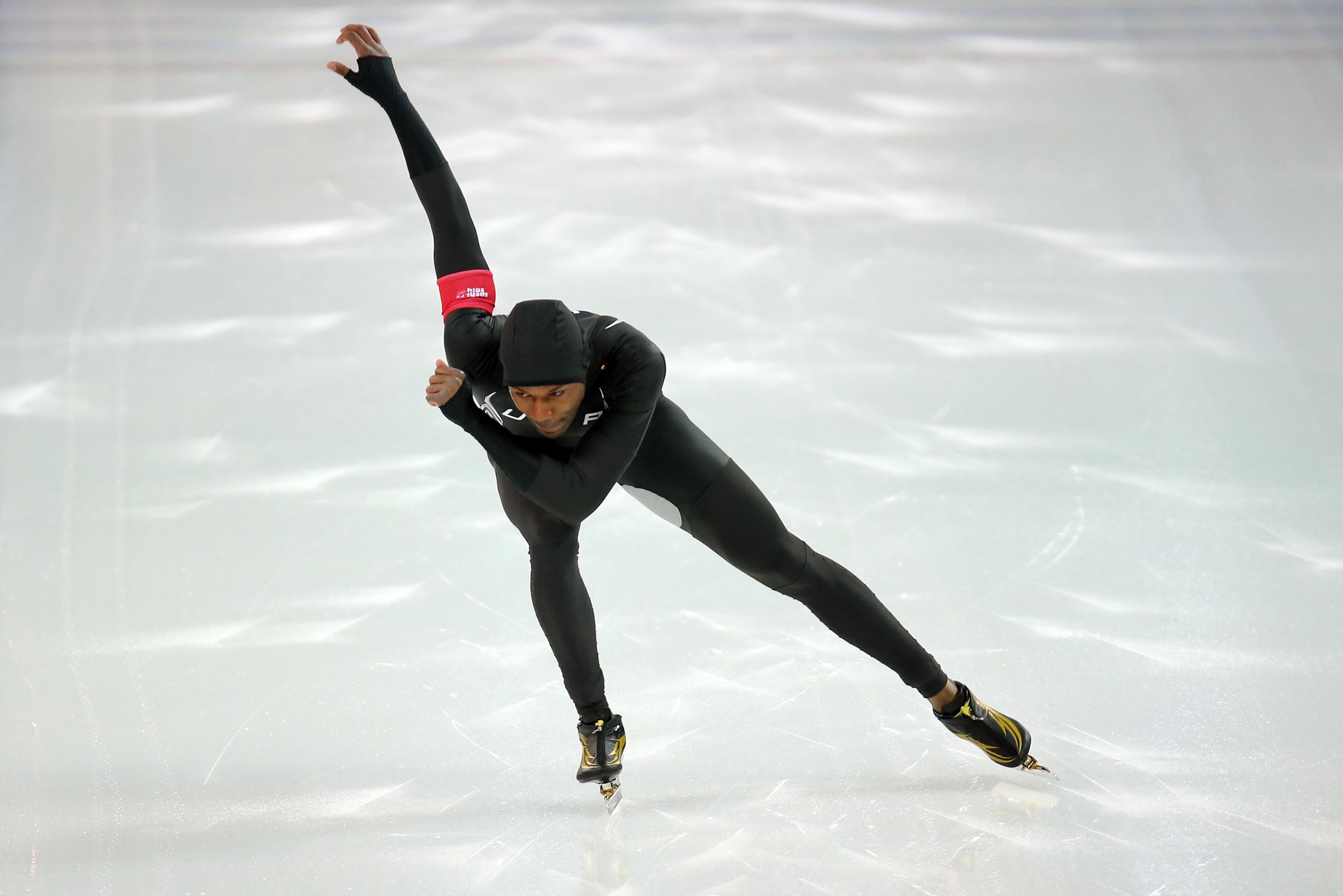Yesterday, Josh Levin and I wrote about why snowboarders hate Shaun White. Today, as part of Slate’s ongoing series on how athletes feel about other athletes, I want to talk about American speedskater Shani Davis, and why speedskaters love him.
White and Davis have a lot in common. Both men have been the best in the world at their respective sports. Both put a high priority on victory while showing little interest in demonstrating anything resembling “team spirit”—White practices in private halfpipes, while Davis trains apart from his U.S. teammates. Davis, like White, went into Sochi gunning for his third consecutive gold medal in his marquee event, the 1000 meters. Davis, like White, couldn’t make it a three-peat—he finished in eighth place. But whereas White’s failure to medal prompted no small amount of schadenfreude among snowboarding devotees, few speedskaters—and few hardcore speedskating fans—are happy to see Shani Davis fail.
Who are these “hardcore speedskating fans” that I speak of? With the exception of this one guy who I think lives in Wisconsin, I am talking about people from the Netherlands. Speedskating is dominated by the Dutch, those anthropomorphic snowmen for whom the sport is a national obsession. Of the 96 medals that the Netherlands has won since the Winter Olympics began, 92 have come in speedskating. The country’s top speedskaters—Sven Kramer, Michel Mulder, Ireen Wüst —are national heroes. The king of the Netherlands proposed to his wife on ice skates, for Pete’s sake.
And yet despite the surfeit of homegrown stars, the Dutch have a special place in their hearts for Shani Davis, the misunderstood American skater who is so very good at what he does. In an entertaining article for the Wall Street Journal, Joshua Robinson explained just how strong this love is. “Davis shows up on the covers of Dutch skating magazines. He has earned sponsorship deals from Dutch loan providers and cellphone companies. He has even been the subject of a nationally broadcast, 60-minute documentary about his life.” Davis, who visits the Netherlands regularly, keeps a picture of Dutch skating luminary Erben Wennemars on his refrigerator. He was recently photographed adorably sharing a bicycle with Dutch speedskater Koen Verweij, one of his 1000-meter rivals.
In one sense, it’s obvious why Dutch skaters and Dutch sports fans love Davis. He’s a decorated champion, he respects speedskating’s history and traditions, and he’s nice to the Dutch people. Also, he seems to enjoy bicycles. Make this man a Dutch citizen already!
But there’s a more interesting reason why the Dutch love Shani Davis: They think he’s a beautiful skater. As opposed to many of his fellow American Olympians, who come from inline skating backgrounds and have adapted their techniques to the ice, Davis is a speedskating native, a rink rat since the age of 6. He has been refining his beautiful, fluid style for 25 years, and if you know what you’re looking for when you watch him skate, it shows. In the Journal, Robinson quotes the Dutch national long-track coach raving about Davis’ “skating qualities, his incredible technique, his beautiful corners.” Speedskating fans don’t just love Davis because he wins a lot of races. They love that he does so with preternatural grace.
This appreciation for athletic aesthetics reminds me of Brazilian soccer fans, who want their national team to win and play beautifully—joga bonito, they call it. This is also why tennis fans respect Rafael Nadal but love Roger Federer, whose strokes approach the platonic ideal of how the game should be played.
This is why Shaun White and Shani Davis are perceived so differently. In speedskating, where everyone is racing against the clock, the best-loved athletes are the ones who win in style—Dutch loan providers don’t sign sponsorship deals with graceful Americans who finish in fifth place. In snowboarding, which began less as a competition than a kind of aesthetic laboratory, the best-loved competitors are the ones who seem to place style and camaraderie ahead of victory.
Davis, the beautiful winner, is in perfect alignment with the characteristics his sport prizes the most. And White, the inwardly focused double gold medalist, often finds himself in opposition to snowboarding’s idealized view of its own beliefs and values. This is less about who Davis and White are as people than it is about speedskating and snowboarding. If Davis was a snowboarder, everybody would hate that he trains alone, and that he’s obsessed with maximizing his own results. On the bright side, a few more people in the U.S. would know his name. And if White were a speedskater, his face would be plastered on every denomination of Dutch currency. He’s stylish, he’s a winner, and his hair is brilliant orange. Perhaps Shaun White picked the wrong sport—in another lifetime, the Flying Tomato would have been the Flying Dutchman.
